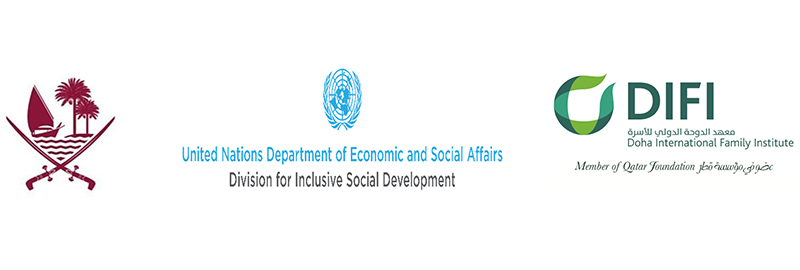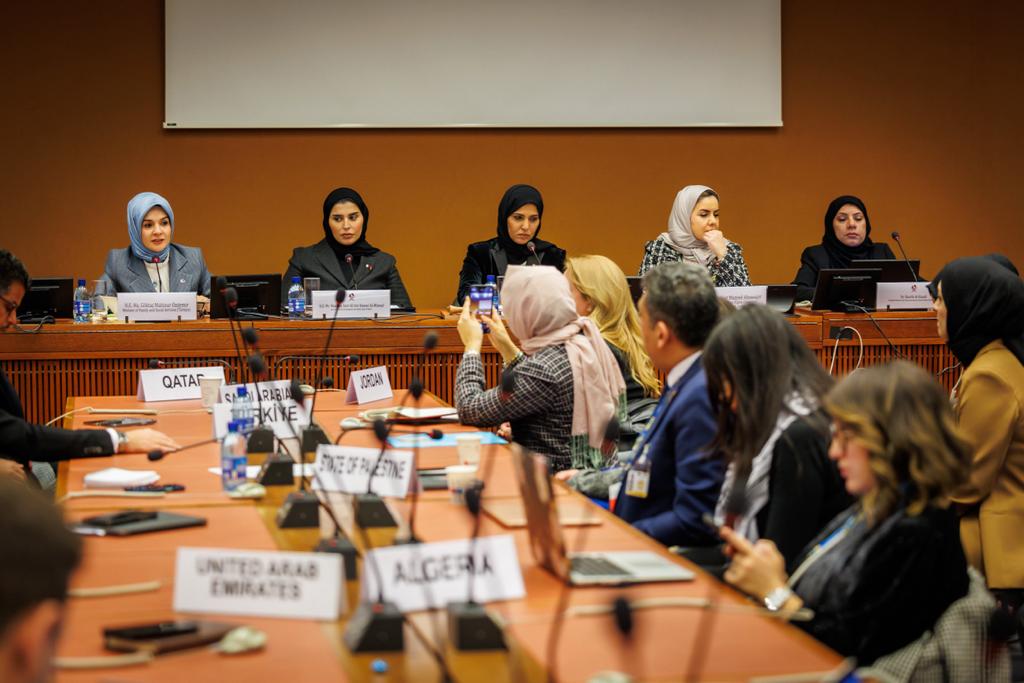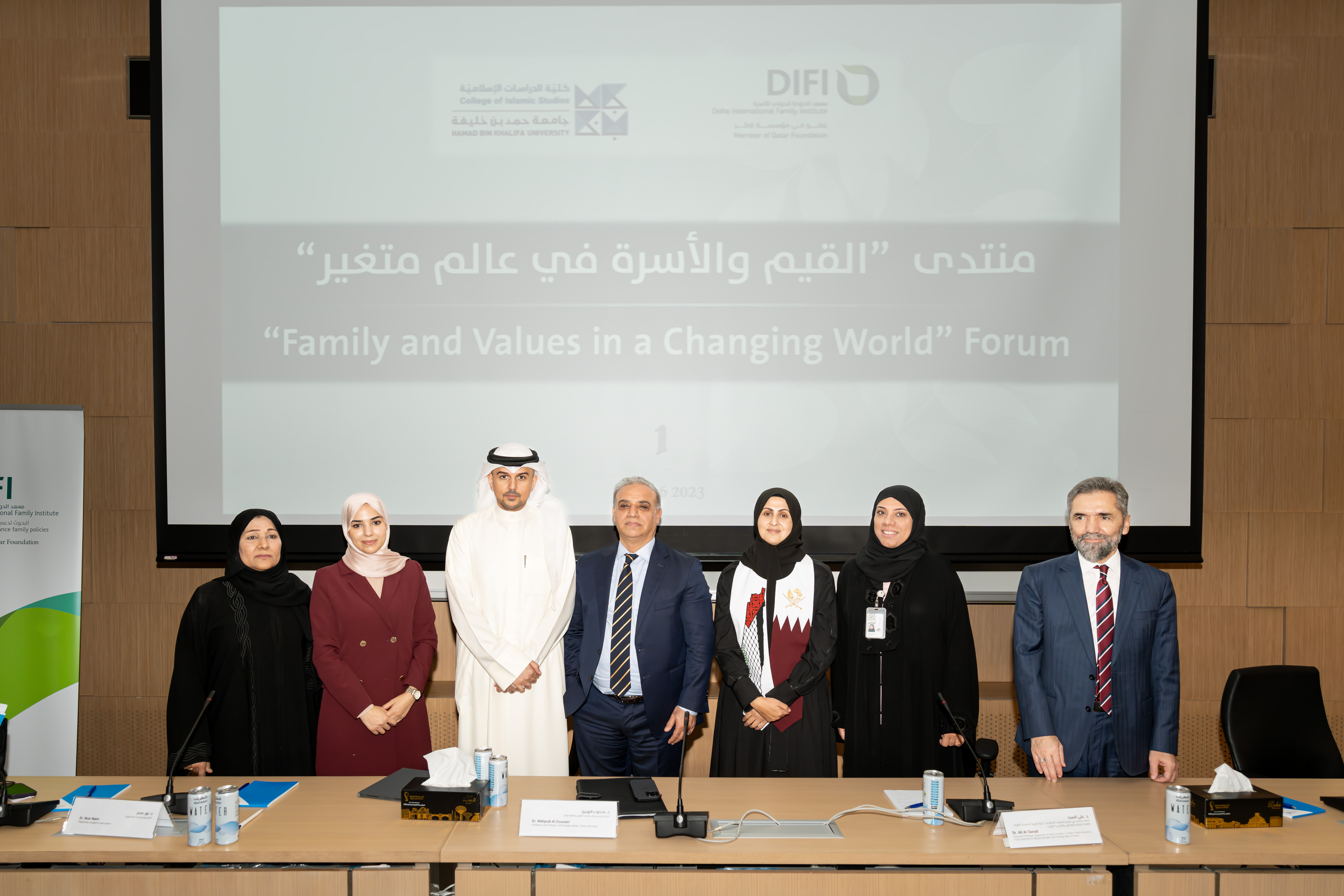
Our discussion with Dr. Ayesha Al-Qahtani about “The role of the father in instilling language, values, and religion in children.”

Organized by the Permanent Mission of the State of Qatar to the UN, the Doha International Family Institute and the UN Department on Economic and Social Affairs (UNDESA)
77th Session of the UN General Assembly
Towards the Protection and Empowerment of Families
The Impact of Megatrends
Co-sponsoring countries: The State of Qatar
Co-sponsoring organizations: UN DESA
Location: Virtual
Languages: Arabic and English, based on speakers’ preferences. Translation will be provided.
Background
In preparation for the thirtieth anniversary of the International Year of the Family, which will be held in 2024 (IYF+30), the Doha International Family Institute (DIFI), in partnership with the Permanent Mission of the State of Qatar to the UN and the UN Department of Economic and Social Affairs (UNDESA) are organizing a side-event along the 77th Session of the UN General Assembly. The side-event aims to address the topic of “Towards the Protection and Empowerment of Families: The Impact of Megatrends” and will be held virtually on the 20th of October 2022.
The side-event will bring together experts, civil society, and UN representatives to further discuss and explore the four mega-trends set by the UNDESA on: Demographic Trends, Migration and Urbanization, Climate Change and Technological Changes, thus paving the way towards the implementation of the IYF+30 commemoration.
The mega-trends offer a set of challenges facing families across the globe. They pave the way to linking multiple issues within a larger picture, drawing out the possible solutions and ways forward to strengthen families and promote their empowerment. Addressing technological changes for example, sheds light on our current day realities, while allowing for a focus on work-family balance policies made possible because of new technologies, and on parenting education, especially when considering the impact of digital technologies on children and adolescents and the roles that parents need to play to adhere to these new changes and mold their parenting techniques around them.
Demographic trends are another critical path affecting families worldwide. Changes within the family unit affect society as a whole, especially when considering the global trend towards delays in marriage and childbearing. Moreover, it is critical to understand the impact of the ‘youth bulge’ in certain areas and the implications of ageing societies in other areas.
Migration and urbanization represent two further major topics that begin with the family and affect its core structure. Whereas multiple drivers facilitate migration globally, they all affect the family. These drivers include the individual at the micro level, the socio-cultural at the meso level, and an array of factors at the macro level-such as security, human and economic development, demographic drivers and so forth. One of the main factors also affecting migration is that of urbanization, where a familial decision to move to an urban environment is based on multiple factors. The implications to such a decision vary, such as migrating parents leaving their children behind in rural areas with their grandparents; a growing urban poverty status of families; lack in affordable housing as well as the selection of housing based on family-related factors such as child schooling.
Finally, the fourth mega-trend, climate change, represents a current reality affecting every child, woman and man worldwide. With increasing temperatures, and extreme weather frequently experienced, families are finding themselves in poverty, or without homes or in need to migrate to most hospitable nature to survive.
The aforementioned mega-trends are vast and inclusive, affecting families in multiple ways. They are also interlinked in many scenarios, where families find themselves in need to adapt to multiple trends at once. In order to support families, policies and programs need to be developed, molded and implemented to provide responsive measures towards addressing these global mega-trends and their impact on family life. The side-event aims to feed into the various discussions held around them, towards formulating and enhancing ideas and solutions towards the many challenges facing families.
Preparations for IYF+30
This side-event is not the first to be organized by DIFI towards the commemoration of the IYF+30, in fact, the institute has contributed to the discussions surrounding the preparations for the IYF+30 in various ways as explained below:
In preparation for the international conference, DIFI has organized the following events:
DIFI also plans to organize a regional EGM, in partnership with UNDESA and IFFD, in preparation for the IYF+30 in South Africa, in January 2023. This will be followed by 2 other regional EGMs in 2023, one in Asia and in Latin America.
The first summit of family-friendly NGOs took place during the IFFD International Congress in London, 2019. Pro-family international NGOs, including DIFI, came together and pledged to collaborate on the preparations of the 30th anniversary of the IYF. Since then, DIFI has been working with IFFD and other pro-family non-governmental organizations in the drafting of a Civil Society Declaration that will be shared with the UN-DESA and its member states. The initial stakeholder NGOs include:
To further strengthen the declaration, DIFI and the above-mentioned NGOs have organized focus group discussions tackling the 4 mega-trends, with the aim of gaining expertise knowledge and insight on the topics of the IYF+30, to further develop and strengthen the Declaration.
DIFI also participated in the launch of the Civil Society Declaration in Brussels, on 17 May 2022.
Objectives
The side-event will be held in preparation for the IYF+30, aiming to discuss the impact of the megatrends on the protection and the empowerment of families, thus providing a larger picture on the way forward. To that end, the side-event aims to address the following:
Name: Daniela Bas
Position: Director, Division for Inclusive Social Development
Organization: UNDESA
Name: H.E. Ambassador Alya Ahmed Saif Al-Thani
Position: Permanent Representative of the State of Qatar to the UN
Organization: State of Qatar
Name:Dr. Sharifa Noaman Al Emadi
Position: Executive Director
Organization: Doha International Family Institute
Name:Ms. Renata Kaczmarska
Position: Focal Point on the Family
Organization: DISD/UNDESA
Name: Dr. Iman Eriqat
Position: Chief of Mission
Organization: UN Migration, IOM Qatar
Name:Dr. Susan Walker
Position: Associate Professor in Family Social Science & Founder of the Parentopia Project
Organization: University of Minnesota, Minneapolis
Name: Dr. Zitha Mokomane
Position: Associate Professor in Demography, Health and Society
Organization: University of Pretoria, South Africa
Name: Dr. Gonzalo Castro de la Mata
Position: Executive Director
Organization: Earthna



The Doha International Family Institute (DIFI) has launched the OSRA research grant in its sixth cycle which is a research grant on Arab families and family policy related issues.
Find Out More